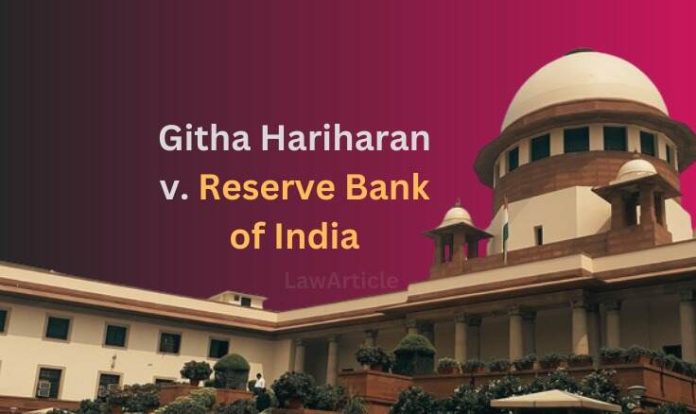Introduction
The case challenged the constitutionality of section 6 of the Hindu Minority and Guardianship Act, 1956. The section granted primary guardianship of the child to the father, relegating mothers to secondary status. The petitioner argued in the court that the provision violates the principle of ‘gender equality’, creating unrequired discrimination between the parents of the child, based on their genders. Thus, being contradictory to the provisions of The Constitution of India, and must be held unconstitutional.
Facts of Ms. Githa Hariharan vs Reserve Bank Of India & Anr
Ms. Githa Hariharan applied to the Reserve Bank of India (RBI) for 9% Relief Bonds to be held in the name of her minor son. However, the Reserve Bank of India (RBI) requires the signature of the father or the certificate of guardianship from a competent authority. Now, this discrimination on the basis of gender led to a challenge in the court.
Issues
There were three issues raised in the matter:
- Whether the section 6 of The Hindu Minority and Guardianship Act, 1956 is unconstitutional or not;
- How the word “after” in section 6 of The Hindu Minority and Guardianship Act, 1956 shall be interpreted;
- Whether or not custody of the child and maintenance shall be granted to Ms. Hariharan.
Arguments
For the petitioner
The petitioner contended that section 6 of The Hindu Minority and Guardianship Act, 1956 contravenes the constitutional mandate of gender equality under articles 14 and 15 of the Indian Constitution; as it designated the father as the primary natural guardian and relegated the mother as secondary status.
The petitioner also contended that the statute does not reflect the child’s best interest that the father of the child is unable to provide for him properly and that the child’s custody shall be granted to her and her rights and role as a mother shall be recognized equally.
For the defendant
The defendant stated that the signature of the father or the certificate of guardianship was a requirement as per the existing legal framework and the compliance of the same was necessary and justified.
The defendant also contended that the statutory language was clear and provided the primary guardianship to the father that the provision itself was not unconstitutional and that they would adhere to the traditional interpretation of the same.
Judgment on Ms. Githa Hariharan vs Reserve Bank Of India & Anr (1999)
The Hon’ble Court declared section 6 of The Hindu Minority and Guardianship Act, 1956 as unconstitutional on the basis of discrimination based on the gender of the parents of the child.
The word ‘after’ shall be interpreted considering the fact that the father must not be absent and disinterested in providing for the child’s basic requirements and care. The mother’s role shall be given priority in the cases where the father is absent or disinterested in the welfare of the child and not only when the father is not alive.
The Hon’ble Court also instructed the district court to decide the matter of custody in accordance of the new interpretation of the law.
Conclusion
The laws shall be interpreted in consistency with the provisions of the constitution. There shall also be reforms made in the existing law whenever necessary to make sure that the constitutional rights of the citizens are not affected.
Also Read:
Rights of undertrial prisoners in India
How To Send A Legal Notice In India




